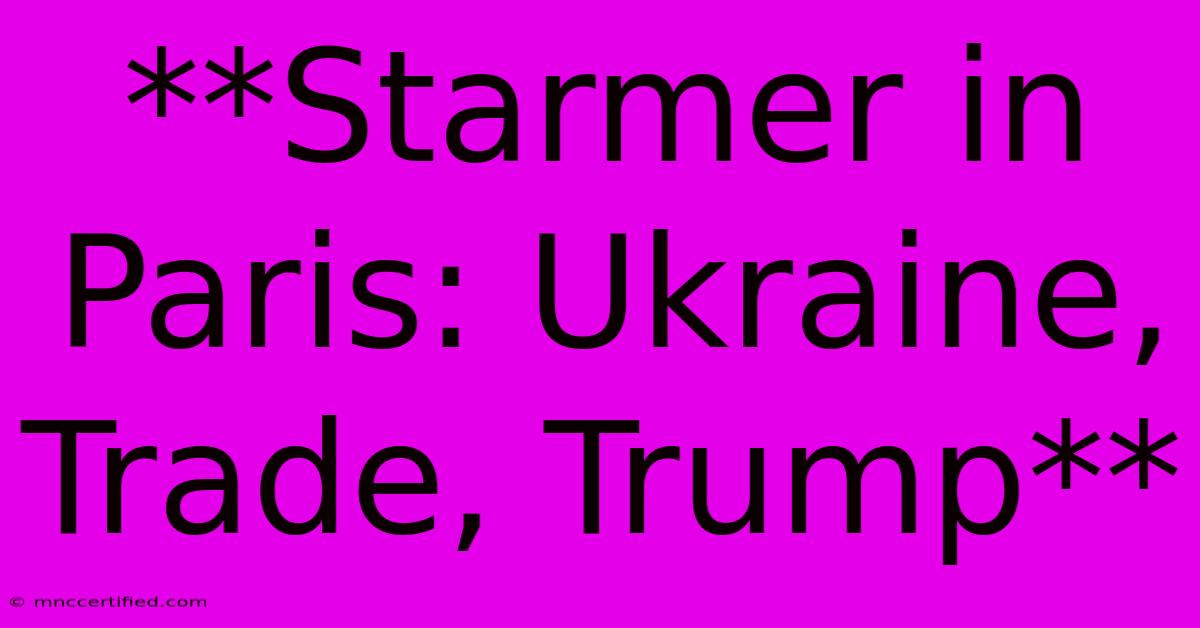**Starmer In Paris: Ukraine, Trade, Trump**

Table of Contents
Starmer in Paris: Ukraine, Trade, and the Shadow of Trump
Sir Keir Starmer, the leader of the UK's Labour Party, recently made a high-profile trip to Paris, engaging in talks with French President Emmanuel Macron. The meeting, which took place amidst a backdrop of escalating tensions in Ukraine and ongoing trade negotiations between the UK and the EU, was a significant moment in international diplomacy. This article delves into the key topics discussed during the visit, analyzing their implications for both the UK and the wider international community.
A Focus on Ukraine: Shared Concerns and Collaborative Action
The ongoing conflict in Ukraine dominated discussions between Starmer and Macron. Both leaders expressed deep concern over the situation, highlighting the need for a united international response to Russia's aggression. The UK and France have been key players in providing military and financial support to Ukraine, and the meeting reaffirmed their commitment to working together to ensure Ukraine's sovereignty and territorial integrity.
Starmer emphasized the importance of strengthening NATO's presence in Eastern Europe, advocating for increased defense spending and enhanced military cooperation among member states. He also stressed the need to impose stricter sanctions on Russia, targeting its economy and its ability to wage war. This shared stance on Ukraine signals a strong commitment to transatlantic security and highlights the shared concerns of the UK and France regarding Russian aggression.
Trade Talks and a Balancing Act: The UK's Post-Brexit Future
The meeting also touched upon the ongoing trade negotiations between the UK and the EU. While the UK has formally left the EU, the relationship between the two remains complex. The UK is seeking to negotiate a comprehensive trade deal with the EU, but disagreements over issues such as fishing rights and regulatory alignment have led to significant hurdles.
Starmer acknowledged the importance of maintaining a strong economic relationship with the EU, emphasizing the need for a trade deal that benefits both sides. However, he also stressed the importance of upholding the UK's sovereignty and ensuring its ability to strike its own trade deals with other countries. This stance reflects the delicate balancing act the UK faces as it navigates its new role in the global economy.
The Ghost of Trump: A Shared Desire for International Cooperation
The meeting between Starmer and Macron comes at a time when the world is increasingly divided. The rise of populist and nationalist sentiment, exemplified by the presidency of Donald Trump in the United States, has challenged the traditional order of international cooperation. Both Starmer and Macron expressed their commitment to multilateralism and their belief in the importance of working together to address global challenges.
They stressed the need for a rules-based international system, emphasizing the importance of institutions like the United Nations and the World Trade Organization. This shared desire for international cooperation underscores the importance of maintaining a strong and stable global order, particularly in the face of increasing geopolitical instability.
Looking Ahead: A Vital Relationship in an Uncertain World
The meeting between Starmer and Macron serves as a reminder of the vital relationship between the UK and France. Despite Brexit and the evolving international landscape, the two countries remain deeply intertwined, sharing common interests and facing common challenges. The meeting signals a commitment to strengthening the strategic partnership between the UK and France, demonstrating their shared resolve to address global issues and maintain stability in a turbulent world.
The success of this partnership will depend on the ability of both countries to overcome their differences, prioritize their shared interests, and work together to build a more just and peaceful world. The issues discussed during Starmer's visit to Paris – Ukraine, trade, and the spectre of Trump – represent the complex and challenging realities of the 21st century. It is in the face of these challenges that the UK and France must find common ground and forge a united path forward.

Thank you for visiting our website wich cover about **Starmer In Paris: Ukraine, Trade, Trump**. We hope the information provided has been useful to you. Feel free to contact us if you have any questions or need further assistance. See you next time and dont miss to bookmark.
Featured Posts
-
Mtv Emas Taylor Swift Sabrina Carpenter Win
Nov 11, 2024
-
Dogecoin Outpaces Xrp Flippening Analysis
Nov 11, 2024
-
Insurance Companies In Harrisburg Pa
Nov 11, 2024
-
Non Cancellable Disability Insurance
Nov 11, 2024
-
Inter Miami Post Messi The Outlook
Nov 11, 2024